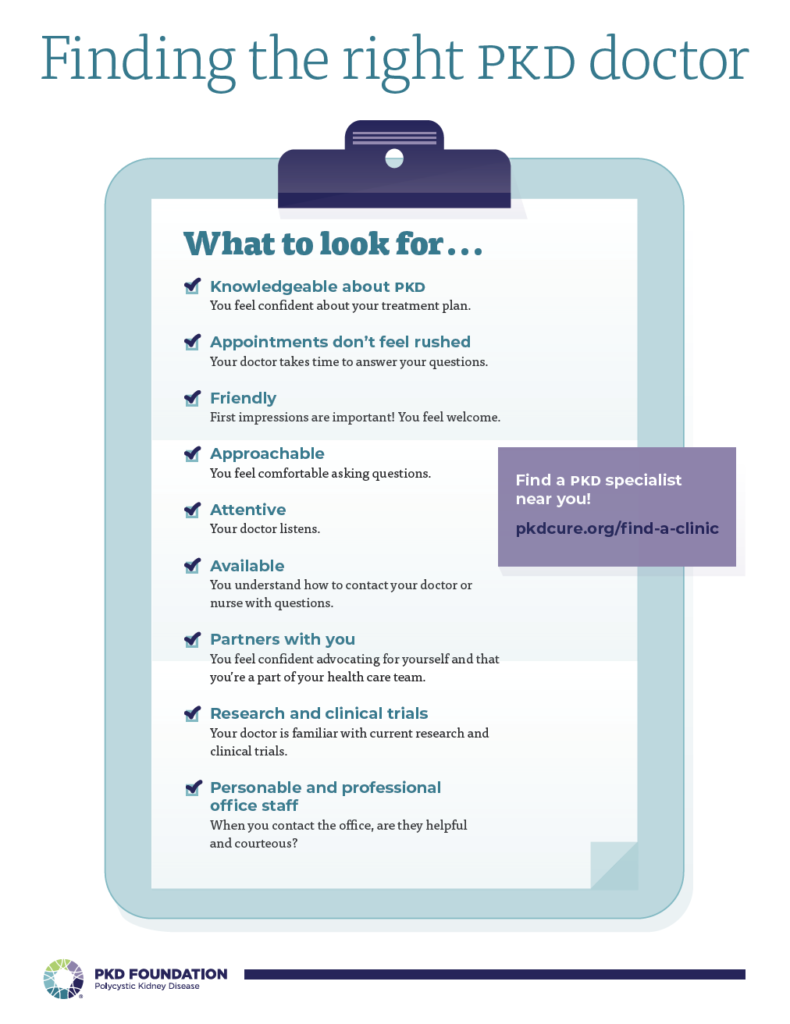Working with your doctor
![]()
What kind of doctor should I see?
In addition to your general practitioner (also called an internist), you should also see a doctor who specializes in kidneys. A nephrologist (kidney specialist) will be able to advise you best on how to care for your polycystic kidneys and the other related symptoms. Ideally you would find a nephrologist with experience treating PKD, but this could be difficult depending on where you live.
If you have more than one doctor, they should all be working together in a coordinated approach to your health care. This does not always happen so you must not be afraid to vocalize your concerns and ask your doctors to talk to each other, especially if you are getting conflicting advice from them. If you are being prescribed medication by multiple doctors, keep track of this and be sure to tell each doctor about all of your prescriptions to ensure no adverse effects arise.
Find a doctor(s) who you trust and with whom you work well. Don’t be afraid to “shop around” or visit with several different doctors until you find one you like and trust. Be involved in your own health care and become your own expert by gathering as much information as possible about PKD and any other health concerns you may have. This will assist you in knowing your choices and allow you to make well-informed decisions. Pay attention to symptoms and write them down, including details like: when symptoms started; what time of day they occur and how frequently; how long they last and what makes them better or worse. This will give you and your doctor a clear picture of what is happening. Ask questions and make certain you understand the answers. Don’t be afraid to ask them to repeat the answer if you don’t understand the first time.
Choosing a nephrologist familiar with PKD
There is no one simple answer on how to pick a good nephrologist (or any physician for that matter). Selecting a physician who meets your needs is a multi-step process, the key being the ability to network. Here are some tips on how to find a good nephrologist:
- Word of mouth – Talk with other patients in your area with similar health concerns for a doctor recommendation. Your friends or co-workers may also know someone dealing with similar health issues that would share information about their health care providers.
- Primary Care Physician (PCP) – Ask your PCP for a referral to a nephrologist familiar with PKD.
- Academic referral – Try calling the closest major academic medical center or university hospital/medical school and ask for the nephrology department.
- Issues of insurance – You may be limited on what nephrologists or specialists you can see by your insurance provider. Make sure to check your insurance company’s provider list.
- Details of referral – Consider all aspects of the doctor and the practice you are looking to join as a patient. Make sure the office meets your expectations for returning phone calls and getting in touch with your physician or nurse.
- Be your own best advocate – To effectively use our current health care system, you must be your own best advocate. Do not be afraid to interview your doctor and ask questions.
Locating a pediatric nephrologist in your area
Finding a nephrologist familiar with issues related to children is important to getting the best care possible for your child. Locating a doctor in this specialty, however, can be challenging.
The American Society of Pediatric Nephrology has indicated families who need assistance in locating a doctor familiar with kidney issues in children can send an email to info@aspneph.com. When contacted by families, the organization will provide a listing of all pediatric nephrologists in the family’s home state.
What about prescription medications?
Know about the medications you are taking. When one of your doctors prescribes a drug, be sure to ask questions like:
- What does this drug do?
- What are the advantages of this drug?
- What are the possible side effects?
- Is it dangerous to take this drug with any foods, beverage or other medications
- I’m taking other (including over-the- counter medications), is this a problem?
- Will any other condition I have be aggravated or made worse by this drug?
- Are there alternatives to this drug (generic brand, other medication, different treatment)?
In addition to talking to your doctor, ask your pharmacist questions regarding over-the-counter medications and your medical condition. Never take medications that were prescribed for a friend or other family member.
The PKD Foundation does not offer medical advice. The information shared on this website is not intended to be a substitute for professional medical advice, diagnosis, or treatment. We strongly recommend that your care and treatment decisions be made in consultation with your healthcare professional team.
Types of doctors
Primary care — general practitioner (G.P.) or family doctor
Nephrologist — kidney specialist
Hepatologist — liver specialist
Transplant surgeon — doctor who performs transplants
Renal dietician — nutrition and diet specialist focusing on kidney and dialysis patients
Pharmacist — expert in drug chemistry and how drugs may interact with each other


Get the latest information on treating PKD.
Receive notifications when there are clinical studies in your area.
Page last reviewed November 2022








